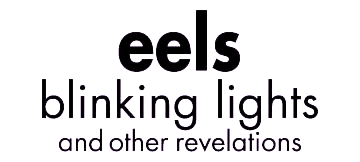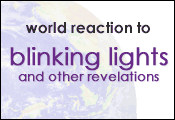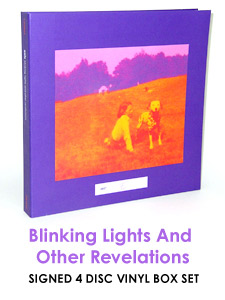
The new eels album, BLINKING LIGHTS AND OTHER REVELATIONS, is a two disc
album about "God and all the questions related to the subject of God," says it's
creator, Mark Oliver Everett, also known as eels leader E. "It's also about
hanging on to my remaining shreds of sanity and the blue sky that comes the day
after a terrible storm," he adds, "and it's a love letter to life itself, in
all its beautiful, horrible glory."
A homemade epic, BLINKING LIGHTS is an imaginative, emotional reflection on
the condition of living, recorded mostly in Everett's Los Angeles basement over
a period of several years. Sprawling over it's two discs are songs about
faith, responsibility, growing up, dignity, disappointment, comfort, hope and
renewal. It's the most personal eels album since 1998's ELECTRO-SHOCK BLUES.
That
album dealt with the nearly simultaneous suicide of Everett's sister and
terminal illness of his mother, from the subjects' points of view. This album
finds
him a few years down the line, now battling some of the family demons
himself, with the after effects of past tragedies becoming more of a personal
issue
in his adult life, sometimes fearlessly autobiographical, and other times built
around the related stories of others.
Echoes of Everett's Virginia youth are heard during a fever-dreamed summer
night's picnic inside the Civil War-era graveyard near his family's house ("In
The Yard, Behind The Church), while the engineer of a dying travel industry
laments the long gone Washington & Old Dominion Railroad that once ran nearby
("Railroad Man"). "I recently took a train trip across America," Everett says,
"and it was clear that these are the dying days of rail travel. I got friendly
with some of the old men who still work on the trains and I noticed that I had
a similar sense of displacement in today's music industry."
The last eels album, 2003's SHOOTENANNY!, nominated by judges Tom Waits and
Cameron Crowe for the 2003 Short List Music Prize, was essentially the document
of a live four piece rock band in the studio, recorded in ten days, as a kind
of working vacation from the long and arduous process of making BLINKING
LIGHTS.
Finally completed in 2004, BLINKING LIGHTS rides a wide aural spectrum of
sometimes disparate, ghostly sounds -- from the saxophone sextet gospel of "Son
Of A Bitch," to the surf-rock operatic wail of "Old Shit/New Shit." There's the
apocalyptic fire and brimstone of "The Other Shoe," and then there's the
Jackie Wilson-in-cyberspace existential celebration of "Hey Man (Now You're
Really
Living)."
The album is full of unusual instrumentation and some notable guest stars.
One song ("Last Time We Spoke") features Everett's hound dog, Bobby, Jr.,
howling a lonesome solo. A few songs later, eels-fan-turned-collaborator Tom
Waits
cries a solo -- literally -- ("Going Fetal"). Later on, R.E.M. guitarist Peter
Buck (making his second appearance on an eels album) plays dobro, guitar and
bass (the Buck co-written "To Lick Your Boots"), and on an album that
prominently features the autoharp on several songs, it's exciting to know that
the king
of rock & roll autoharp, The Lovin' Spoonful's John Sebastian, makes a rare
appearance, playing autoharp on one track ("Dusk: A Peach In The Orchard," co-written by Sebastian).
Sometimes eels music is simple and pretty (DAISIES OF THE GALAXY), other
times grating and loud, even scary (SOULJACKER) -- according to Everett, that
depends on how he feels the story is best served. If it sometimes resembles
catchy, popular music on the surface, that's Everett's chosen mode of
celebration.
There's always something heavy lurking just beneath. Everett is an artist who
steadfastly refuses to play by the rules of today's entertainment machine, and
is willing to pay the price:
"After the commercial success of the BEAUTIFUL FREAK album (1996), I made a
decision. It all seemed like such an empty experience, being in that world of
what's cool and popular at the moment. It represented everything I hated and
now I was becoming part of it. It was making me hate myself more than I already
did from my upbringing! And I was learning some great lessons about what
matters from the tragedies that were occurring. I needed to go somewhere deeper.
If
any of the records sold less didn't matter to me."
"As a result I was labeled a troublemaker and difficult and all those things
anyone worth their salt should be called. The music business no longer values
artistic vision of any kind. They want cooperation. But you have to protect
your work, or they'll water it down until whatever was once good about it is
unrecognizable. It's a never-ending source of exhaustion trying to keep your
artistic ship on course these days. God be with you."
Of course, we're talking about an artist who, when asked to give a quote for
the dust jacket to Kurt Cobain's posthumously published diaries submitted this
quote: "Please don't do this to me after I kill myself." (The publishers
opted not to use the quote.)
And an artist who was singled out by George W. Bush during the 2000 campaign
for the U.S. presidency for writing "obscene"
songs (the lovely "It's A Motherfucker" from DAISIES OF THE GALAXY, among
them) and who, after being told by the Late Night With David Letterman producers
that he could not use the term "goddamn" on network television, sang a medley
of censored rock's greatest hits during his first appearance on the show --
all while standing on the very stage where The Ed Sullivan Show originally
censored, or tried to censor them ("Let's spend some time together/Girl we
couldn't
get much higher...").
Everett's colleagues describe him as a troubled and complicated individual,
angered by a "mixed-up, backwards world," as he sees it. What sets him apart
from the garden variety misanthrope is that, somehow, he keeps a little twinkle
in his eye. "If you're disappointed in the state of things, then you have some
idea of what things could be, and I do recognize the good things in people
and the world we live in. It's my job to celebrate those things as well," he
says. This may help explain why eels' music is often described as sounding
simultaneously sad, yet somehow life-affirming. It's hard not to feel lighter
when
the people-hating recluse of "I Like Birds" (DAISIES OF THE GALAXY) confesses
his fondness, and offers shelter, for all things feathered.
Often misdiagnosed as being ironic in instances that are anything but,
Everett says it's a sign of the times that he could be so misunderstood. "I do
have
a sense of humor, and I can't help but laugh at how silly all the machinations
of the pop star life are, but when we play 'Get Ur Freak On' (eels' 2001
SOULJACKER tour) it's not about being 'kitschy.' I love that song and was
excited
to hear something new on the radio that I loved and so I wanted to celebrate.
Just because it's a hit doesn't have to mean it's not a great song -- it's so
spooky and exciting. We did our best to rock it and make it our own. It was my
favorite song to play that year." He adds, "I make fun of the roll of the pop
star, the media, and of myself, but I would never make fun of the music.
Music saved my life."
Everett's father, famed quantum physicist Hugh Everett III, author of the
Many Worlds Theory, died in 1982. His sister, Elizabeth committed suicide in
1996
and his mother, Nancy, who appears in a childhood photo on the cover of
BLINKING LIGHTS, succumbed to cancer in 1998. "I would have ended up like my
sister
a long time ago except for one thing -- music," says Everett, "I've been very
lucky to have that to hold onto. I take it very seriously. Maybe too
seriously. It's everything to me."
"The family I grew up with was completely gone by 1998. I dealt with it at
the time by making ELECTRO-SHOCK BLUES. But it's something that is never going
to change for me and its implications are far-reaching in my life," he says.
And the "curse" didn't let up after 1998, either: Everett's cousin Jennifer was
a flight attendant on the plane that hit the Pentagon September 11, 2001.
"There's kind of a ghostly sound to a lot of BLINKING LIGHTS," says Everett,
"maybe because I'm living with a bunch of ghosts."
The son of the man who invented the concept of parallel universes is an
artist who works on more than one level at a time, whose last world tour (2003)
often opened with back to back covers of "Tiger Man" ("I'm the king of the
jungle!") and "I'm A Loser." While this made for an exciting and unexpected
opening
to an eels rock show, the singer had a deeper intent: "I wanted to make a big
entrance and come out thumpin' my chest, figuratively, but then show what's
inside that chest -- an insecure heart. That's why someone beats on their
chest."
When asked about the inspiration for disc two's "Whatever Happened To Soy
Bomb," Everett says, "The only reasonable answer to the title's question is 'who
cares?' This was the 'performance artist' that invited himself onstage during
Bob Dylan's performance on an awards show, gyrating with the meaningless words
SOY BOMB written on his chest. There was no point. It wasn't punk. It wasn't
Andy Kaufman. It wasn't even Jarvis Cocker storming Michael Jackson's performance, which at least had some point to it. Maybe I'm just an old railroad man,
but it seemed like a sign of the stupid times we live in and it makes me long
for a more dignified time."
After a life full of some intense and horrific episodes, while looking back
and taking stock in disc two's closing "Things The Grandchildren Should Know," there's an extraordinary moment when the bloodshot and world-weary Everett
clears his eyes and finds that life is still sweet enough to live all over
again.
"There are two kinds of Christmas people," Everett says, "those who like
their Christmas lights to stay on solid and those who like them to blink. As a
kid, I always had a thing for sitting in the dark and watching the lights blink
on and off at random." Now he says this fascination goes much further. "In the
end, what we have are these little, great moments. They come and they go.
That's as good as it gets. But, still, isn't that great?"
|
Release date: April 26, 2005



|
as performed by
Mark Oliver Everett,
a man often called E
with:
Koool G Murder, Chet,
Puddin', Butch,
and a cast of thousands
featuring:
Bobby, Jr., Tom Waits,
John Sebastian, Peter Buck
Release Date: April 26, 2005
TRACK LISTING
Disc 1:
theme from blinking lights
from which i came/a magic world
son of a bitch
blinking lights (for me)
trouble with dreams
marie floating over the backyard
suicide life
in the yard, behind the church
railroad man
the other shoe
last time we spoke
mother mary
going fetal
understanding salesmen
theme for a pretty girl that
makes you believe god exists
checkout blues
blinking lights (for you)
Disc 2:
dust of ages
old shit/new shit
bride of theme from blinking lights
hey man (now you're really living)
i'm going to stop pretending
that i didn't break your heart
to lick your boots
if you see natalie
sweet li'l thing
dusk: a peach in the orchard
whatever happened to soy bomb
ugly love
god's silence
losing streak
last days of my bitter heart
the stars shine in the sky tonight
things the grandchildren should know
|
|